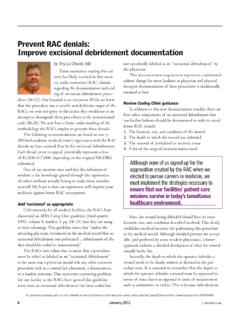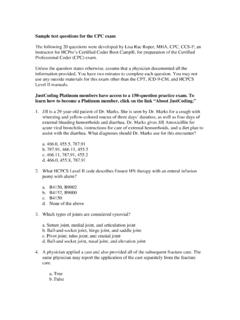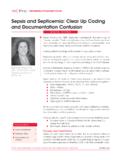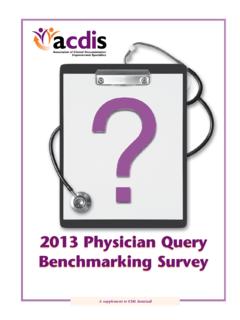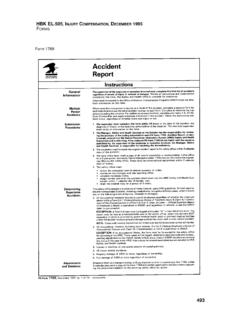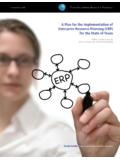Transcription of DECEMBER 2001 Certify Financial Need Before You …
1 Certify Financial Need Before You waive copayments or Deductibles .. Model Policy: waive Copaymentsor Deductibles Only After PatientsProve Financial Need (p. 3) Model Form: Use Form to GetWaiver Request (p. 4)CMS Issues New Instructions onDiagnostic Tests.. 4In the News: CMS Transmittal on ICD-9 Coding .. 6 HIPAA Strategies: Start ComplianceTasks Now Without Wasting Effort on HIPAA Privacy Regs that May Change .. 7We ll tell you what changes andclarifications to the HIPAA privacyregulations are likely and whichprivacy compliance tasks are safe to start the Insider.. 8 Voluntarily Disclosing ProviderFraud to Plan Supervising Physician Need NotBe RadiologistGetting Paid: Don t Let Hold HarmlessClause Bar You from LegitimatelyBilling Plan Members.
2 9 Stop plans from using your contractto benefit members at your 2001 Certify Financial Need Before You waive Copaymentsor DeductiblesRadiology practices sometimes choose not to collect patient copayments anddeductibles. The patient may claim poverty. Or the amount (for example, $5or $10) may not seem worth pursuing. Or the practice may view waivingthese payments as a way to increase business. But waiving copayments ordeductibles is tricky business. Legal experts tell the Insiderthat the lawallows you to waive these payments only in certain situations. If your policyis to waive these payments routinely, you may be violating the federal FalseClaims Act, as well as the federal antikickback law and similar state you risk fines of up to $25,000 and possible exclusion from federalinsurance programs for violating the federal antikickback law alone.
3 If thepatient has private insurance, you could be giving the patient s insurer anopening to escape paying its share of your bill. Smart practices waive copayments and deductibles only after determiningthat paying them would impose a Financial hardship on the patient. We llexplain how they make this decision. And we ll give you a Model Policy (see p. 3) and a Model Form (see p. 4) that you can adapt and distribute toyour staff to help you avoid this health care fraud Waiver of copayments and Deductibles Can Lead to Legal PenaltiesWaiving copayments or deductibles can get you into three types of legal Claims Act usually pays 80 percent of the reasonable charge.
4 To calculate reasonable charges, Medicare looks atactual charges. By waiving copayments and deductibles, you re misstatingyour actual charge. So you re overbilling Medicare. Example:If you tell Medicare that your charge for a procedure is $500,but you routinely waive a 20 percent copayment, you re really charging $400(80 percent of $500). If Medicare pays you 80 percent of $500, you ve over-billed them by $80. That s because your actual charge is really $400, soMedicare should pay you 80 percent of that, which is $320.(continued on p. 2)IN FUTURE ISSUES Don't Discuss Compliance Snafus Online What's New in CPT 2002 Managed Care Plans Target Overread ArrangementsRADIOLOGYADMINISTRATOR SCOMPLIANCE& REIMBURSEMENTINSIDERnow has prior approval by theAmerican Academy of Professional Coders (AAPC) for up to 10 Continuing Education Units peryear.
5 If you re a Certified Professional Coder (CPC) or Certified Professional Coder-Hospital(CPC-H), you can get one credit every time you send the AAPC a synopsis/scenario usinginformation learned from an INSIDER article. For more details, visit the AAPC Web site, The logo at right will now appear on all issues of the INSIDERas a reminderof this ! Get AAPC Continuing Education Units for reading the INSIDER!RADIOLOGY ADMINISTRATOR S COMPLIANCE & REIMBURSEMENT INSIDER2 DECEMBER2001 2001 by Brownstone Publishers, Inc. Any reproduction is strictly prohibited. For more information call 1-800-643-8095 or visit law for Medicare and Medicaid Ser-vices (CMS) (formerly known as HCFA) says that routine waivers ofcopayments and deductibles violate the federal antikickback law, accordingto Scott Becker, a health care attorney with Chicago-based Ross & s because routine waivers can be an incentive to patients to bring youtheir Medicare- or Medicaid-reimbursable business which could lead toabuse of Medicare or Medicaid resources.
6 Even if you re not offering thewaiver for the purpose of luring Medicare patients, you risk a costly andtime-consuming OIG investigation, says Becker. Failure to comply with obligations under managed care managed care agreements require practices to collect copayments anddeductibles from patients, says Becker, Before they collect from the man-aged care plan. Based on this clause (which you may find in the coordina-tion of benefits section of your agreement), the managed care plan maychoose not to pay you if you waive copayments and deductibles, says Beck-er. And courts may agree with the insurer s position. Result? You get paidnothing for your :Waiving copayments and deductibles may also permityour malpractice carrier to argue that it s not liable for claims filed by thepatients from whom you didn t Decision to waive on Financial NeedFortunately, says Becker, you can reduce your risk of violating the law andnot getting paid by instituting a simple policy: waiving copayments ordeductibles only in cases of documented Financial hardship.
7 Setting and fol-lowing such a policy helps prove to CMS that you don t waive these pay-ments routinely, Becker explains. After drafting your policy, give a copy to all billing staff and post thepolicy in patient registration areas. Explain to your staff that the policy isn tintended to attract patients; rather, it s to be used as a way to handle requestsfrom patients who can t afford the copayment or deductible. Your policy, like our Model Policy, should do the general rule against offering your policy withthe general rule that you don t offer any kinds of incentives, such as kick-backs, bribes, rebates, or waiver of copayments or deductibles, to anyone forbringing health care business to your practice, says Becker [Policy, par.]
8 1].State exception for Financial , set out the exception:that billing staff of your practice may waive copayments or deductibles onrequest but only if the patient offers specific proof of Financial hardship,says Becker [Policy, par. 2].Define Financial there s no set definition of financialhardship, prudent practices base their definitions on an impartial third-partystandard. Becker advises using the federal poverty guidelines as a startingpoint. For example, you may choose to waive copayments and deductibles forpatients whose gross family income is at or below, say, 200 percent of the cur-rent federal poverty guidelines [Policy, par.
9 3]. Our Model Policy lists the year2001 guidelines, which were published in the Federal Registerin your policy every year to reflect the most recent guidelines. Certify Financial NEED (continued from p. 1)Editor:Jill K. Gormley, Editors: David B. Klein, Esq.,Nicole R. Lefton, Esq., Janet RaySenior Legal Editor: Susan R. Lipp, Editors: Nancy Asquith, Heather OgilvieCopy Chief: Tamar M. FriedmanCopy Editors: Cynthia Gately, Graeme McLeanProofreader: Lorna DrakeProduction Director: Mary V. LopezSenior Production Associate: Sidney ShortProduction Associate: Dennis T. BorrusoDirector of Planning: Glenn S. Demby, Project Editor: Rebecca L.
10 Margulies, of New Media: Michael T. Borruso, Director: Peter StoweDirect Marketing Manager: Thomas A. GiordanoList Management Director: Vijay ThakkarData Processing Manager: Rochelle ContiDirector of Operations: Michael KoplinSales Manager: Joyce LemboCustomer Service Rep.: Helena TherezoFulfillment Supervisor: Edgar A. Pinz nFinancial Manager: Janet UrbinaPublisher: George H. Schaeffer, : Andrew O. Shapiro, Esq., John M. Striker, : Radiology Administrator s Compliance & Reim-bursement Insider (ISSN 1527-2338) is published monthly. Sub-scription rate: $355 for 12 monthly issues. Address allcorrespondence to: Brownstone Publishers, Inc.
